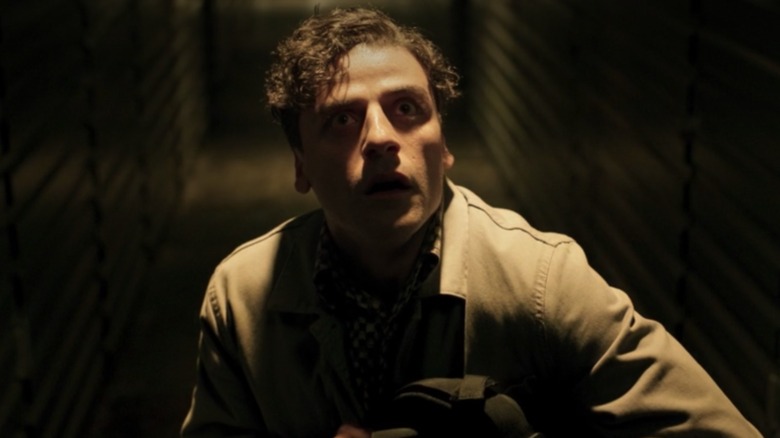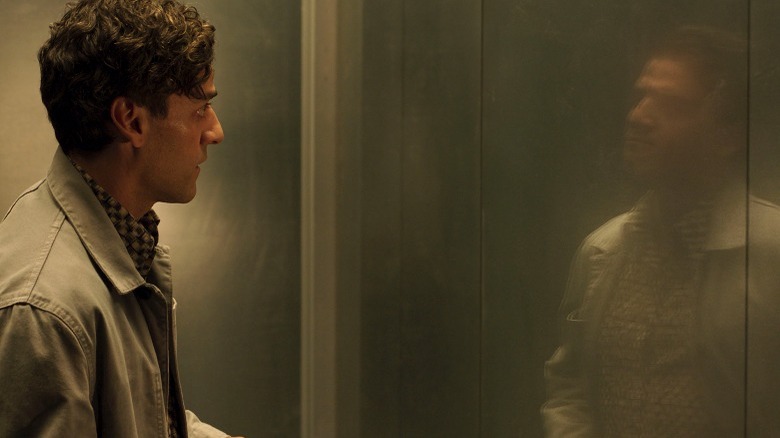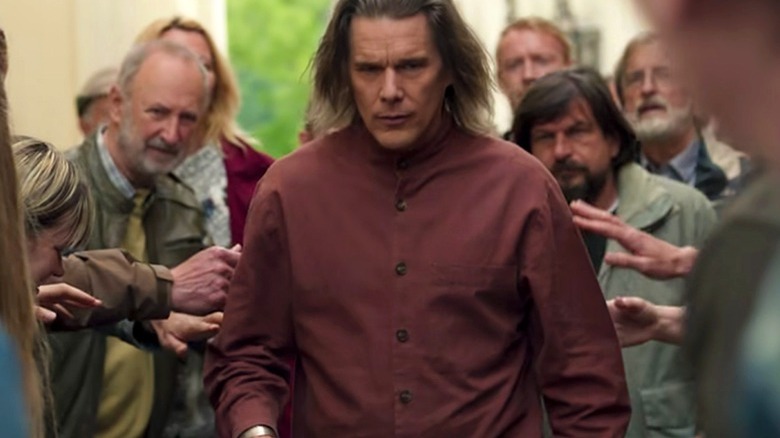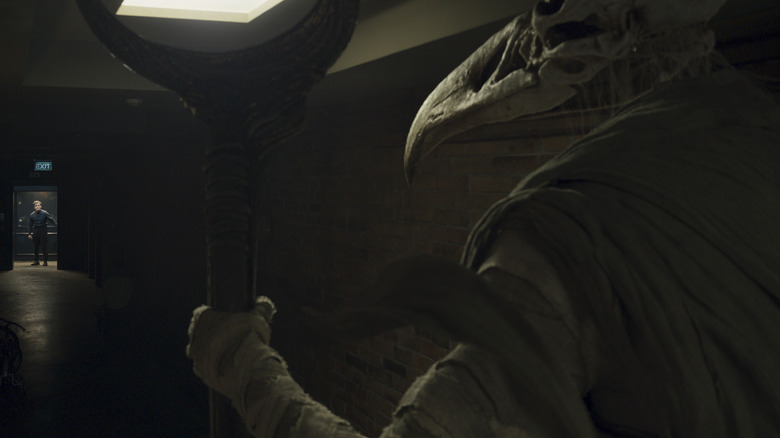Moon Knight Merges Superhero Storytelling With Horror Imagery To Thrilling Results
Warning: this article contains major spoilers for episode 1 of "Moon Knight."
Marvel's "Moon Knight" is a superhero origin story like no other, in the sense that it expertly melds its central mystery with genuinely unsettling horror aspects that help elevate the narrative.
The horror-esque vibe of the show is introduced right from the first frame, in which Arthur Harrow (Ethan Hawke) carries out a ritual that seems like some sort of offering to the gods, replete with corporal mortification (he fills his shoes with glass shards as an act of penance). Given that Harrow is a cult leader, leading many misguided souls who worship the Egyptian deity Ammit, "Moon Knight" helps establish an uneasy, cult vibe from the get-go, accentuated by Harrow's foreboding presence throughout the rest of the episode.
Any narrative that dives deep into the psychological aspects of a character is potentially interesting, and "Moon Knight" manages to achieve the beats of a psychological horror narrative while enwrapped in superhero trappings. Steven (Oscar Isaac) is in a constant state of paranoia throughout the episode, unable to distinguish between his dreams and waking nightmares, which is already terrifying to begin with. Then "Moon Knight" ups the horror ante throughout, bringing in ancient beasts and terrifying gods into the mix.
The haunting question of identity
Steven is initially unaware of his other alternate identities, as it is hinted that a wall existed between the personalities that allowed them to carry out their own ends without interference. However, something snaps, hurtling Steven headfirst into Marc's world when he finds himself at Harrow's commune in the Alps after he falls asleep. Even before this incident occurs, Steven endures deeply unsettling experiences: he does not remember asking his colleague out, loses out on two whole days without consciously knowing, and has to pick up pieces of social interactions that do not even belong to him, as he is not privy to those memories.
This, in itself, is a solid horror premise, which reminded me immensely of Will Graham's predicament in NBC's "Hannibal" — although set in an entirely different context, Will had major gaps in time and had sleepwalking tendencies like Steven, which led to doubts about who he really was and what he was capable of, and what he actually did during those memory gaps. In "Moon Knight," this schism in identity is exacerbated during the sequence in the Alps, as the poor guy has no idea who Harrow is and what the cult wants from him, and suddenly blacks out and comes to his senses, only to find that he has beaten the bad guys to a pulp during that lost time.
To not have control over one's body, to hear voices, to see one's reflection act and speak of its own accord — all of these aspects are classic horror tropes. The horror of "Moon Knight" is more psychological and grounded, as Steven/Marc suffers from dissociative identity disorder (DID), and to see Steven grappling with his latent personality and feel utterly alone in his struggles is heartrending, especially in the scenes in which the terrifying figure of Khonshu appears in his waking reality.
The obsessive drive of a cult
Harrow's cult is an ominous presence in episode 1, as they are everywhere, masked as an everyman, which accentuates Steven's helplessness during difficult situations. Harrow explains his motivations, which entail resurrecting Ammit, the Devourer of the Dead, in order to bring about a twisted sense of justice and the dubious notion of ushering "heaven on earth." A kernel of terror is embedded in these notions, especially in the way Harrow justifies his murders, based on Ammit's arbitrary judgment of those who might walk a path of evil in the future.
The lengths to which Harrow will go to retrieve the scarab (which includes summoning a godforsaken beast to kill an innocent man), are reflective of similar horror premises that center on cults. "The Ritual" and "The Wicker Man" come to mind, where a commune worship a beast/deity to further their own ends, although these films greatly differ in terms of narratorial and motivational context. The reason why Harrow works as a villain is due to how understated he is: his calm veneer masks something more dangerous, including a need to unleash an ancient demon who commits preemptive murder to "eradicate" evil from its root.
Ancient deities, beasts, and demons
The trippiest parts of "Moon Knight" are entrenched in horror, but also humor, which makes it such an interesting watch. The elevator scene comes to mind, of course, where Steven watches this terrifying, bogeyman figure lunge towards him, only for him to realize it is an elderly neighbor (who seems equally creeped out by the exchange with this oddball). Prior to that, Khonshu's arrival is the stuff of nightmares, as there is a sudden gust of wind that rattles everything in the vicinity, and this ancient figure just pops out of nowhere, making everything feel more unhinged and unsettling.
Steven also loses conscious bodily autonomy in the scene in which he wants to hand over the scarab to Harrow, but is physically unable to do so as Khonshu won't let him (it is hilariously shot, but the implications are dire for Steven). The actual transition between his personalities is also visualized to great effect: a glitch in the psyche, almost, where the audience, like Steven, is not privy to what happens when Marc takes over, which keeps us on the same page as Steven, who is as anxious and mild-mannered as one gets (an excellent choice, accent and all, as it helps distinguish the two personalities to great effect).
Then there's the scene towards the end of the first episode, with the otherworldly jackal hounding Steven across the museum, which is pure, unadulterated horror. Cornered in a bathroom stall, with the beast trying to get inside, Steven makes the decision to let his alter-ego, Marc Spector, take over, although he has no idea what that exactly entails. This obviously leads to the suit reveal (glider clock, crescent darts, glowing eyes, the whole thing), but it is only a matter of time before Steven is back in control, which is bound to lead to further doubt, paranoia, and confusion.
Episode 1 of "Moon Knight" is streaming now on Disney+.



